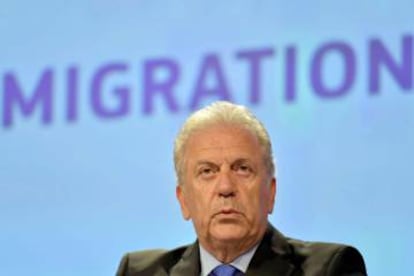Andalusia, Catalonia want fairer distribution of migrant minors in Spain
Regions struggling with surge in unaccompanied minors say other parts of the country not doing enough

The Spanish government will meet with regional leaders on Monday to address the redistribution of thousands of underage immigrants, the vast majority of whom are currently in the care of authorities in Andalusia, Catalonia, and the Spanish cities of Ceuta and Melilla on the northern coast of Africa.
The constant trickle of migrant minors – there are now over 7,000 of them – has become a priority of the immigration policy being defined by the Socialist administration of Pedro Sánchez, who assumed power in June following a successful no-confidence vote against Mariano Rajoy.
Right now we can’t afford to lose Spain
Frontline regions and those that have taken in a larger share than others are asking for a more balanced distribution of unaccompanied minors, as their own infrastructure has become insufficient. Between 50 and 100 underage migrants are sleeping out in the streets of Melilla, while in Andalusia, minors lie on mattresses on the floors of shelter cafeterias for lack of enough proper beds.
In Catalonia, the government wants more resources to deal with migrant minors, some of whom have been sleeping in the hallways of Barcelona’s City of Justice legal complex as they await their turn to take an age test and be assigned a shelter.
While Andalusia is caring for 2,597 migrant minors (36% of the total) and Catalonia is doing the same for another 1,012, there are regions of Spain that have barely felt the effects of this sharp rise in unaccompanied minors, such as La Rioja, Extremadura and Castilla y León.

The number of minors under the care of regional authorities has grown from 3,997 in 2016 to 7,145 on June 30, 2018. And this most recent figure does not take into account the spike in migrant arrivals in the month of July, reflecting a rise in migrant flows on the Western Mediterranean route.
While nearly 70% of migrant minors come from Morocco, in the last year there has been a 160% rise in underage migrants from Côte d’Ivoire and Guinea, according to the non-profit Save the Children.
According to Interior Ministry figures, Andalusia is caring for 36% of migrant minors, followed by Catalonia, Melilla, the Basque Country, the Valencia region, Madrid and Ceuta. Under current legislation, their care is the sole responsibility of regional governments.
There are other problems besides the lack of beds. Aid groups and the Ombudsman’s Office have underscored that the shelter system does not guarantee that these minors will integrate into society or the labor force when they turn 18.
At the Monday meeting, government representatives will also ask their regional counterparts for a stricter head count, as some minors – particularly those who are over 16 – run away from their centers to find work. National authorities also want changes to the medical procedure used to determine an immigrant’s age. “That exam needs to be humanized, we can’t simply trust a wrist X-ray,” said a source at the executive.
Fears in Brussels
Meanwhile, the European Commission is showing concern over an increasingly heated immigration debate in Spain, fueled largely by the Popular Party (PP) and Ciudadanos. “Right now we can’t afford to lose Spain,” said a high-ranking EU official about a potential rise of populism there.
The Open Arms returns
A Spanish rescue ship, the Open Arms, is headed for Spain for the third time in a month after saving 87 migrants from the central Mediterranean, near the coast of Libya. The group had been adrift for two days. There are eight minors on board, six of them unaccompanied.
Italy and Malta continue to refuse access to non-profit rescue ships, a fact that will force the Open Arms to make a three-to-four day journey to Spain, where authorities are expected to assign it a port in the coming hours. On July 4, the Open Arms delivered 60 people to the port of Barcelona, and on July 21 it brought a lone survivor to Mallorca. She had been left to die at sea by the Libyan coast guard, along with another woman and a small child who were both found dead by the rescuers.
The same source underscored the EU’s current fragility, with relevant members like Italy, the Netherlands, Poland and Hungary led by governments that either question the European project or are openly hostile to it. And Britain will be leaving the European club in March 2019, the first defection in the EU’s 60-year history.
“In the current scenario, and because of its demographic and economic weight, Spain is a fundamental piece to reinforce the pro-European bloc,” admitted a EU official.
On July 29, the brand new leader of Spain’s conservative PP, Pablo Casado, asserted that “there can’t be legal papers for everyone, nor is it sustainable to maintain a welfare state that can absorb the millions of Africans who want to come to Europe.”
This message has been construed as a sign that the PP wants to turn immigration into a cornerstone of its opposition to the Pedro Sánchez administration. And the center-right Ciudadanos appears to be backing this strategy.
Brussels immediately launched an effort to show that Spain is not alone. On Friday, Immigration Commissioner Dimitris Avramopoulos visited Madrid, where he underscored that “Spain has full support of the European Commission in dealing with the increased arrivals along the Western Mediterranean sea route.”
“If we follow the populists, if we adopt their language, citizens will end up voting for the original version,” he warned in an interview with EL PAÍS prior to his visit.
English version by Susana Urra.
Tu suscripción se está usando en otro dispositivo
¿Quieres añadir otro usuario a tu suscripción?
Si continúas leyendo en este dispositivo, no se podrá leer en el otro.
FlechaTu suscripción se está usando en otro dispositivo y solo puedes acceder a EL PAÍS desde un dispositivo a la vez.
Si quieres compartir tu cuenta, cambia tu suscripción a la modalidad Premium, así podrás añadir otro usuario. Cada uno accederá con su propia cuenta de email, lo que os permitirá personalizar vuestra experiencia en EL PAÍS.
¿Tienes una suscripción de empresa? Accede aquí para contratar más cuentas.
En el caso de no saber quién está usando tu cuenta, te recomendamos cambiar tu contraseña aquí.
Si decides continuar compartiendo tu cuenta, este mensaje se mostrará en tu dispositivo y en el de la otra persona que está usando tu cuenta de forma indefinida, afectando a tu experiencia de lectura. Puedes consultar aquí los términos y condiciones de la suscripción digital.








































